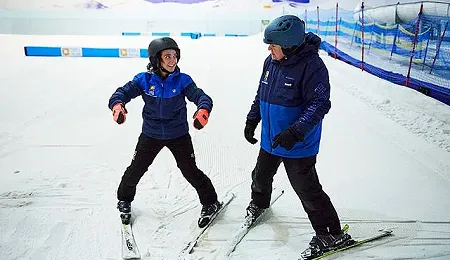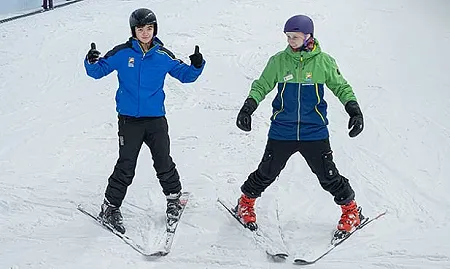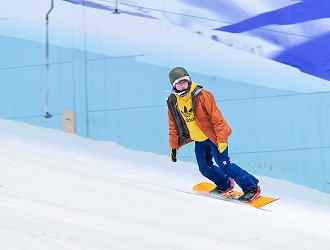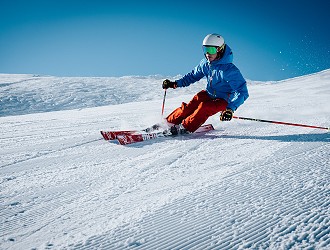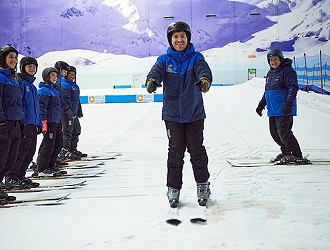How To Avoid a Skiing Injury

Whether you’re a seasoned pro or a complete novice, it is fair to say that skiing is an exhilarating winter sport that is enjoyed by many around the world. But not only is skiing a fun sport that the whole family can take part in, it also has a range of fitness benefits. However, it is important to be aware of the risks that come with the sport too, and how to avoid a skiing injury.
In this blog, we will be sharing our top tips on how you can ensure a safe and enjoyable experience on the slopes by taking a range of precautions. From having the right equipment to awareness of weather and terrain conditions and general snow safety tips, we have all the information you need for a fun and safe ski. We will also cover how you can get slope-ready with the help of our experts here at Chill Factore.
How to avoid skiing injuries - understanding the risks
Before we delve into safety measures, it is important to understand the risks that are associated with skiing. As skiing involves the use of your whole body, you are at risk of injuring any area or body party. The most common injuries include:
- Wrist and thumb fractures
- Head injuries
- Whiplash
- Torn rotator cuff
- Concussion
- Shoulder sprains/ dislocations
- Medial collateral ligament rupture or sprain
- Bruises to the skin
The key to avoiding and preventing these injuries is knowledge, experience, and preparation. So let’s take a look at some of our top tips on how to avoid skiing injuries.
Have and use the right equipment
Before you can put a ski on the slopes you need to have the right clothing and equipment and know how to use it. Your ski equipment should be tailored to your body size, ski level, and the conditions you’ll be skiing in. Here are some of the ski equipment essentials that will ensure your safety:
- Ski boots - these should fit snugly and provide the correct level of support without impeding the circulation in your feet/legs.
- Helmet - this is a skiing must-have. You should never take to the slopes without a helmet. It should fit well and be a specific skiing helmet so that you’re protected correctly.
- Goggles - it is a whole lot easier to stay safe on the slopes when you can see correctly. So wearing goggles is essential to protect your eyes from glare and improve your overall visibility.
- Skis and bindings - these are essential if you want to avoid skiing injuries and they should be adjusted correctly by a professional. Otherwise incorrectly set bindings can lead to injuries and falls.
Here at Chill Factore, the UK’s longest indoor real snow slope, our team can offer expert fitting advice and services to help you select the right equipment.
Weather and terrain conditions
One of the biggest challenges that skiers face when it comes to avoiding skiing injuries is weather and ski terrain conditions. This can change rapidly, meaning the weather when you take to the slopes may be different after an hour or so. Therefore, you need to be prepared - even if you consider yourself to be an experienced skier.
Therefore, we recommend that you check the conditions of the current snow and weather before taking to the slope when considering how to avoid skiing injuries. Similarly, we would advise that you stay on marked trails and avoid venturing off. This can lead to unexpected and dangerous terrain.
And of course, when you’re skiing, be sure to adapt to the conditions. For example, if your visibility is poor then slow down so you have more time to react.
Mastering skiing techniques
While you may be keen to master skiing techniques so that you can be on top of your game and get the most out of your skiing experience, it is also key to your safety. One of the first things you’ll learn about when mastering proper technique is control. This is how you learn to control your direction and speed.
It is also essential that you learn how to stop safely and efficiently. This is essential when skiing as if you can’t control your speed and stop quickly then the chances of you hurting yourself or others increases. As a beginner, this is a technique you should learn straight away.
For example, to slow down to a stop you should turn your toes towards each other and push your heels apart. This should make the gap at the back of your skis wider with a small gap between the tips of your skis.
If you’re new to skiing then you should take lessons to improve your skills and reduce the risk of injury. We have a range of ski lessons available, including ski lessons for beginners, kids ski lessons and more.
Snow safety and ski etiquette
To keep yourself and those around you safe, it is crucial that you have respect for others when looking at how to avoid skiing injuries. This means always following snow safety rules and ski etiquette. For example, you should always remember that the skier in front of you has the right of way and it is your responsibility to keep your distance and avoid them.
Similarly, if you’re overtaking on the snow you should be sure to signal and do so in a manner that doesn’t endanger and startle others. Don’t forget that if you witness an accident then you should alert ski patrol straight away and help secure the area if required.
How to avoid skiing injuries - post-ski recovery
After a day on the slopes, it is crucial that you take the time to recover to avoid any injuries flaring up. It is crucial that you cool down by gently stretching to prevent any stiffness from settling in. You should also replace fluids and energy to help your muscles recover.
Every time you take to the slopes it is your responsibility to look out for yourself and others. By equipping yourself with the right skills, gear and understanding of the conditions you can significantly improve your chances of avoiding skiing injuries. By using the facilities available at Chill Factore, you can get your hands on all the equipment and techniques you need to make the most of this fun sport.
At Chill Factore, we offer a range of facilities and lessons, from snowboarding lessons to ski lessons so you can practise all year round. Whatever you need from Chill Factore, don’t hesitate to contact us today at 0161 749 2222, email us at info@chillfactore.com, or come in to speak to us.

